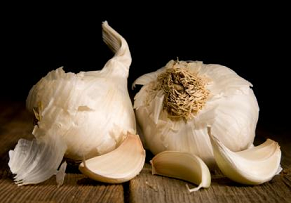Garlic is a vegetable and is best known for flavoring food. Over the years, garlic has been used as a medicine to prevent or treat a wide range of diseases and conditions. The fresh clove or supplements made from the clove are used for medicine.
Contents
Uses
- Garlic is used for many conditions related to the heart and blood system. These conditions include high blood pressure, high cholesterol, coronary heart disease, heart attack, and “hardening of the arteries” (atherosclerosis). Some of these uses are supported by science. Garlic actually may be effective in slowing the development of atherosclerosis and seems to be able to modestly reduce blood pressure.
- Some people use garlic to prevent colon cancer, rectal cancer, stomach cancer, breast cancer, prostate cancer, and lung cancer. It is also used to treat prostate cancer and bladder cancer.
- Garlic has been tried for treating an enlarged prostate (benign prostatic hyperplasia; BPH), diabetes, osteoarthritis, hayfever (allergic rhinitis), traveler’s diarrhea, high blood pressure late in pregnancy (pre-eclampsia), cold and flu. It is also used for building the immune system, preventing tick bites, and preventing and treating bacterial and fungal infections.
- Other uses include treatment of fever, coughs, headache, stomach ache, sinus congestion, gout, rheumatism, hemorrhoids, asthma, bronchitis, shortness of breath, low blood pressure, low blood sugar, high blood sugar, and snakebites. It is also used for fighting stress and fatigue, and maintaining healthy liver function.
- Some people apply garlic oil to their skin to treat fungal infections, warts, and corns. There is some evidence supporting the topical use of garlic for fungal infections like ringworm, jock itch, and athlete’s foot; but the effectiveness of garlic against warts and corns is still uncertain.
- There is a lot of variation among garlic products sold for medicinal purposes. The amount of allicin, the active ingredient and the source of garlic’s distinctive odor, depends on the method of preparation. Allicin is unstable, and changes into a different chemical rather quickly. Some manufacturers take advantage of this by aging garlic to make it odorless. Unfortunately, this also reduces the amount of allicin and compromises the effectiveness of the product. Some odorless garlic preparations and products may contain very little, if any, allicin. Methods that involve crushing the fresh clove release more allicin. Some products have a coating (enteric coating) to protect them against attack by stomach acids.
- While garlic is a common flavoring in food, some scientists have suggested that it might have a role as a food additive to prevent food poisoning. There is some evidence that fresh garlic, but not aged garlic, can kill certain bacteria such as E. coli, antibiotic-resistant Staphylococcus aureus, and Salmonella enteritidis in the laboratory.
Garlic produces a chemical called allicin. This is what seems to make garlic work for certain conditions. Allicin also makes garlic smell. Some products are made “odorless” by aging the garlic, but this process can also make the garlic less effective. It’s a good idea to look for supplements that are coated (enteric coating) so they will dissolve in the intestine and not in the stomach.
Benefits
- High blood pressure. Some research shows that garlic can reduce blood pressure in people with high blood pressure by as much as 7% or 8%. It also seems to lower blood pressure in people with normal blood pressure. Most studies have used a specific garlic powder product (Kwai, from Lichtwer Pharma).
- “Hardening of the arteries” (atherosclerosis). As people age, their arteries tend to lose their ability to stretch and flex with age. Garlic seems to reduce this effect.
- Colon cancer, rectal cancer, and stomach cancer. Eating garlic seems to reduce the risk of developing these cancers. However, garlic supplements don’t seem to offer the same benefit.
- Tick bites. Scientists have compared the number of tick bites in people who take high doses of garlic compared to people who do not take garlic. High doses of dietary garlic, over about a five-month period, seem to reduce the number of tick bites.
- Fungal infections of the skin (including ringworm, jock itch and athlete’s foot). Ringworm and jock itch respond to treatment with a garlic gel containing 0.6% ajoene (a chemical in garlic) that is applied to the skin. A garlic gel with a higher concentration of ajoene (1%) is needed to be effective against athlete’s foot. In fact, garlic gel with 1% ajoene seems to be about as effective against athlete’s foot as the medicine Lamisil.
Interactions
Major Interaction – Do not take this combination
- Isoniazid (Nydrazid, INH) interacts with Garlic. Don’t take garlic if you take isoniazid (Nydrazid, INH).
- Medications used for HIV/AIDS (Non-Nucleoside Reverse Transcriptase Inhibitors (NNRTIs)) interacts with GARLIC.
- Saquinavir (Fortovase, Invirase) interacts with Garlic.
Moderate Interaction – Be cautious with this combination
- Birth control pills (Contraceptive drugs) interacts with Garlic.
- Cyclosporine (Neoral, Sandimmune) interacts with Garlic.
- Medications changed by the liver (Cytochrome P450 2E1 (CYP2E1) substrates) interacts with Garlic.
- Medications changed by the liver (Cytochrome P450 3A4 (CYP3A4) substrates) interacts with Garlic.
- Medications that slow blood clotting (Anticoagulant / Antiplatelet drugs) interacts with Garlic.
- Warfarin (Coumadin) interacts with Garlic.
References
Source: WebMD, “Garlic” , www.webmd.com/vitamins-supplements/

